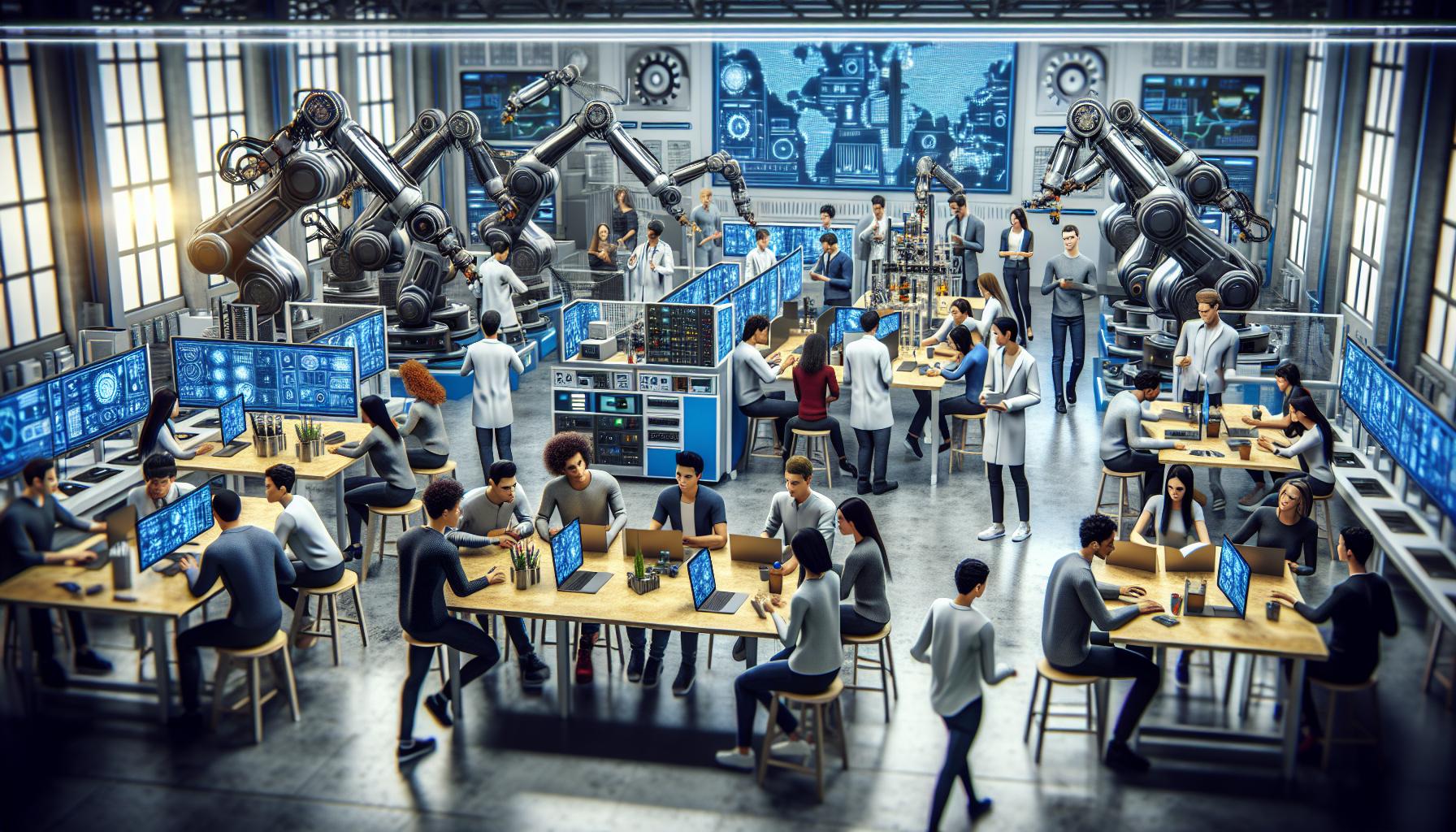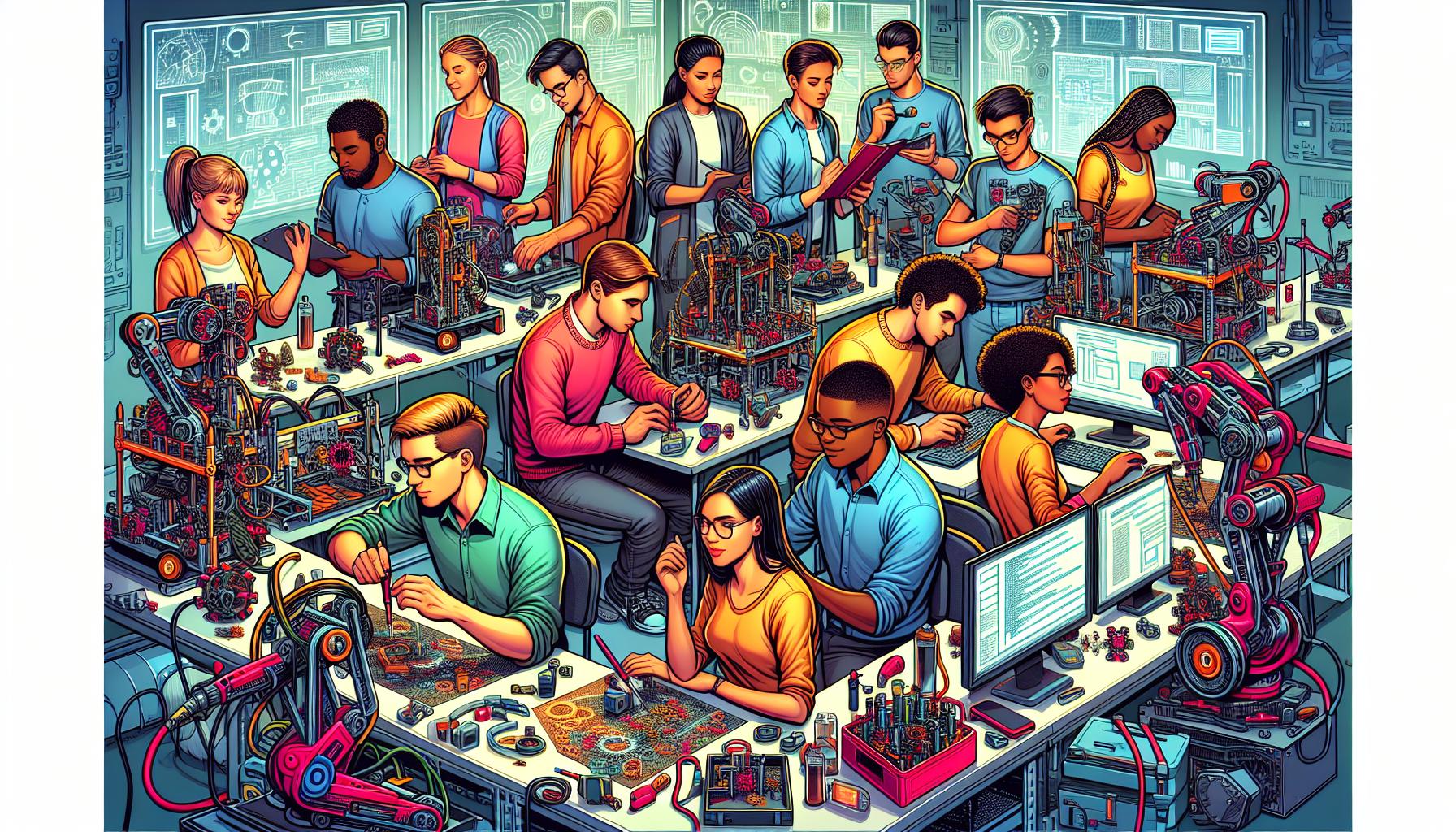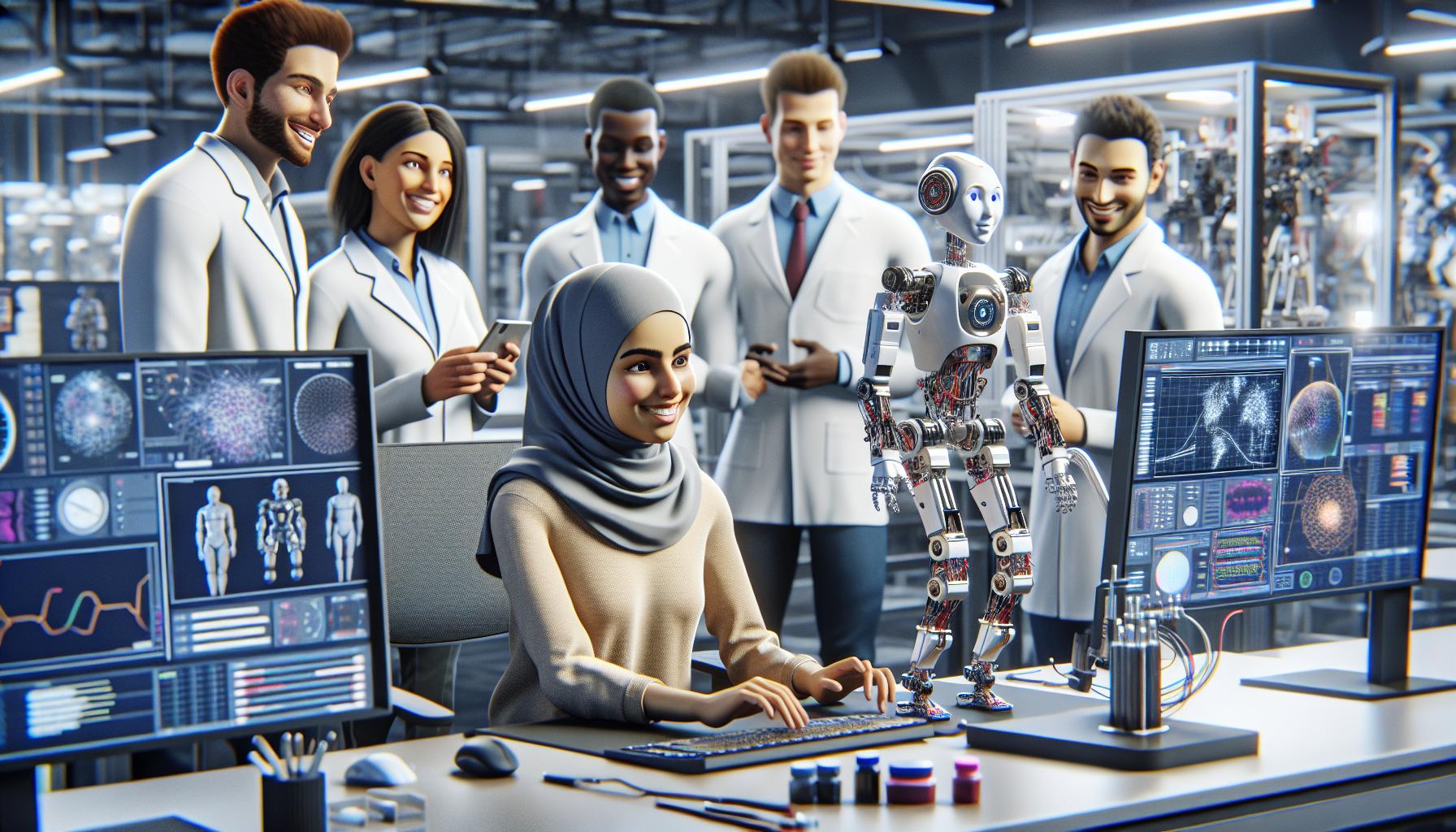When it comes to cutting-edge innovation in robotics, Georgia Tech stands as a beacon of excellence. Nestled in the heart of Atlanta, this prestigious institution has become a powerhouse in developing groundbreaking robotic technologies. With a rich blend of academic rigor and practical application, Georgia Tech’s robotics program consistently pushes the boundaries of what’s possible.
As I delve into the world of Georgia Tech robotics, I’m struck by the sheer diversity of projects and research initiatives. From autonomous drones to advanced humanoid robots, the scope of work is truly impressive. This vibrant ecosystem not only fosters creativity and collaboration but also equips students and researchers with the tools they need to tackle real-world challenges.
Georgia Tech’s commitment to robotics isn’t just about innovation; it’s about shaping the future. By cultivating a culture of curiosity and excellence, the program prepares the next generation of leaders to transform industries and improve lives worldwide.
Key Takeaways
- Georgia Tech’s Excellence in Robotics: Georgia Tech is renowned for its cutting-edge innovation and leadership in robotics, offering a dynamic blend of academic rigor and practical application that consistently pushes technological boundaries.
- Diverse Research Projects: Projects range from autonomous drones to advanced humanoid robots, demonstrating the institution’s comprehensive approach to addressing real-world challenges and preparing students for future careers in robotics.
- Robust Educational Programs: The university offers dynamic undergraduate and graduate programs with hands-on learning experiences, fostering essential skills in areas like machine learning, computer vision, and control systems.
- Interdisciplinary Collaboration: The Institute for Robotics and Intelligent Machines (IRIM) at Georgia Tech encourages cross-disciplinary research partnerships, facilitating advanced developments in human-centered robotics, autonomous systems, and BioRobotics.
- Significant Industry Impact: Collaborations with industry leaders like Intel, Boeing, and Siemens drive innovation, ensuring Georgia Tech’s technologies address both academic and commercial needs, thereby influencing industry practices and shaping future research.
Georgia Tech Robotics
Georgia Tech Robotics represents a pioneering force in robotic technology and education. This program blends rigorous research with innovative applications, solidifying its reputation in the global robotics community. The faculty consists of esteemed experts actively engaged in groundbreaking projects. These projects encompass a variety of applications, from healthcare robots enhancing patient care to autonomous vehicles improving transportation safety.
The Institute for Robotics and Intelligent Machines (IRIM) at Georgia Tech serves as a central hub for robotic research and collaboration. IRIM fosters a dynamic environment that encourages cross-disciplinary partnerships between departments. By uniting researchers from fields like computing, engineering, and biomedical sciences, IRIM promotes the integrated development of cutting-edge solutions.
Students in the robotics program experience hands-on learning through initiatives such as the Vertical Robotics Competition and the Robotarium. This approach provides exposure to real-world challenges, preparing students for careers that shape the future of technology. The program’s comprehensive curriculum covers essential topics like machine learning, computer vision, and control systems, ensuring graduates possess the skills demanded by the industry.
Georgia Tech Robotics continually seeks to advance human capabilities and address societal needs by leveraging robotic technologies. By combining theoretical knowledge with practical applications, the program develops solutions that redefine industry standards and contribute to global progress.
Academic and Research Excellence

Georgia Tech Robotics showcases unparalleled academic and research excellence by driving innovation and preparing competent leaders in the industry.
Renowned Faculty and Experts
The faculty at Georgia Tech includes distinguished experts recognized globally for their contributions to robotics. These esteemed professors lead pivotal research projects, impacting areas like robot-assisted surgery and autonomous vehicle development. I see faculty members consistently publishing in top-tier journals, reflecting their authority and leadership in the field.
State-of-the-Art Research Facilities
Facilities at Georgia Tech provide cutting-edge environments that support groundbreaking robotics research. The Institute for Robotics and Intelligent Machines (IRIM), a central hub, enables multidisciplinary collaboration and exploration. I find students and researchers have access to advanced labs and resources, empowering them to develop novel solutions and enhance human-robot interaction.
Innovative Robotics Programs

Georgia Tech offers a dynamic suite of robotics programs that are designed to push boundaries in technology and education. These programs target both undergraduate and graduate levels, ensuring a comprehensive learning experience.
Undergraduate Programs
The undergraduate robotics curriculum at Georgia Tech provides a solid foundation in core robotics concepts. Students explore areas like autonomous systems and machine perception through coursework and practical labs. Hands-on projects in initiatives such as the BattleBots Competition enhance learning. Access to labs like the Robotarium allows students to experiment with real robots, bridging theory with practice. Students graduate ready to tackle real-world challenges with innovative solutions.
Graduate Programs
Graduate programs in robotics at Georgia Tech offer specialized, research-oriented studies. Students engage deeply in cutting-edge topics like human-robot interaction and robotic manipulation. Opportunities for interdisciplinary collaboration exist, especially through partnerships facilitated by the Institute for Robotics and Intelligent Machines. The Ph.D. program emphasizes advanced research, allowing students to contribute significant innovations to the field. Master’s students benefit from industry-focused courses, preparing for leadership roles in a rapidly evolving sector.
Key Research Areas

Georgia Tech Robotics explores several pivotal research domains, driving innovation and expanding the potential of robotics technologies. These areas focus on enhancing human-robot interaction, developing autonomous capabilities, and integrating biological principles into robotic systems.
Human-Centered Robotics
Human-centered robotics at Georgia Tech prioritizes the development of robots that work seamlessly with people. Researchers focus on improving safety and efficiency in human-robot collaboration. Projects include assistive robots that support tasks in healthcare and service industries and developing algorithms for better understanding human intentions and actions. These initiatives enable robots to interact more intuitively within shared environments.
Autonomous Systems
Georgia Tech advances autonomous systems through research in drone technology, self-driving vehicles, and intelligent decision-making frameworks. Specialists work on enhancing situational awareness and adaptability of robotic systems so they can navigate complex environments. Projects delve into real-time data processing, path planning, and the integration of AI to foster reliable and independent machine operations across diverse scenarios.
BioRobotics
BioRobotics at Georgia Tech combines biology and engineering to create robots that mimic living organisms. This field includes developing robotic systems inspired by nature for applications such as prosthetics and rehabilitation devices. Research focuses on understanding biological movement to inform the design of more agile and efficient robots, enabling improved performance and expanded applications in medicine and healthcare.
Industry Collaborations and Partnerships
Georgia Tech Robotics actively engages with industry leaders to drive innovation in robotic technologies. It leverages partnerships with companies like Intel, Boeing, and Siemens, enhancing research outcomes and aligning academic efforts with industry needs. These collaborations support the development of breakthrough technologies, including automation and AI-driven systems.
Several joint research projects focus on real-world applications. For instance, Georgia Tech and IBM partner on initiatives in AI safety and intelligence, fostering advancements in machine learning that impact sectors from manufacturing to healthcare. Additionally, Georgia Tech collaborates with NASA on autonomous drone technologies, aiming to improve space exploration capabilities.
The Institute promotes student-industry interaction through internships and co-op programs, facilitating skill application in commercial environments. These opportunities prepare students for competitive roles in the robotics field. Industry partners, like Georgia Power and Lockheed Martin, contribute resources and expertise, reinforcing the Institute’s mission to advance robotics research and education.
Impact on the Robotics Field
Georgia Tech’s robotics program has significantly advanced the field of robotics, influencing both academic research and industry practices. The Institute for Robotics and Intelligent Machines (IRIM) at Georgia Tech serves as a collaborative center that not only fosters interdisciplinary partnerships but also spearheads innovative projects like robot-assisted surgery and autonomous vehicles. Renowned faculty members drive these initiatives, contributing transformative solutions to pressing challenges in robotics.
The impact of Georgia Tech extends into real-world applications, where emerging technologies developed by the institution have set new standards. For example, the autonomous systems research enhances drone and autonomous vehicle capabilities, integrating AI for reliable, real-time operations. These advancements have facilitated safer and more efficient processes across various sectors, including transportation and data collection. Additionally, development in humanoid robotics is revolutionizing personal assistant technologies, improving the quality of life through automation and enhanced human-robot collaboration.
Partnerships with industry giants, such as Boeing and Siemens, amplify Georgia Tech’s influence in the robotics domain. These collaborations lead to pioneering research outcomes that directly address market demands. Through joint efforts, the program facilitates technology transfer and commercialization, ensuring that innovative solutions transition smoothly from academic theory to practical, deployable technologies. As a result, Georgia Tech has positioned itself as a global leader, shaping the robotics field with lasting innovations and inspiring future research directions.
Georgia Tech Robotics stands at the forefront of innovation and education in the field of robotics. With a focus on groundbreaking research and real-world applications, the program equips students with the skills needed to lead in a rapidly evolving industry. The collaborative efforts with industry leaders and the diverse range of projects highlight Georgia Tech’s commitment to advancing technology and addressing societal challenges. As a hub for pioneering research, Georgia Tech continues to push the boundaries of what’s possible, shaping the future of robotics and making a significant impact on both academia and industry.

